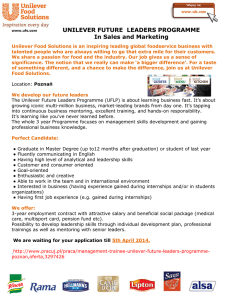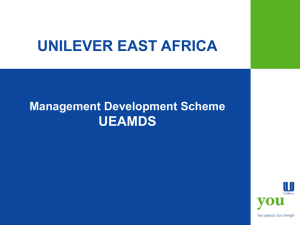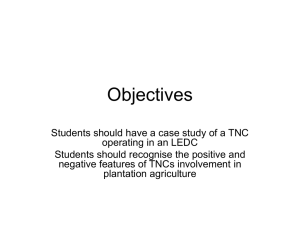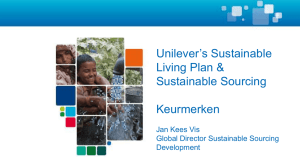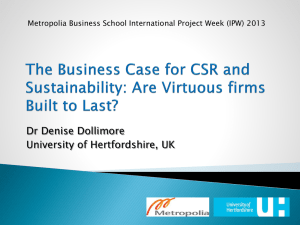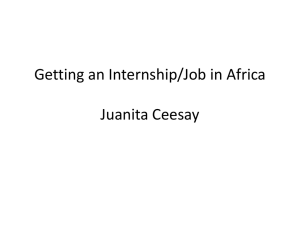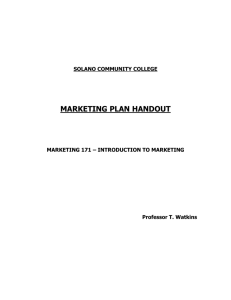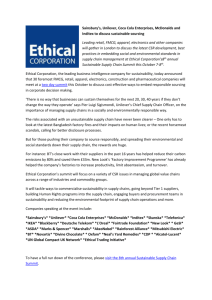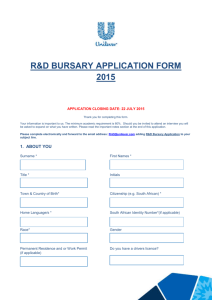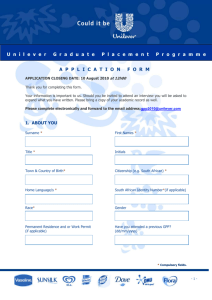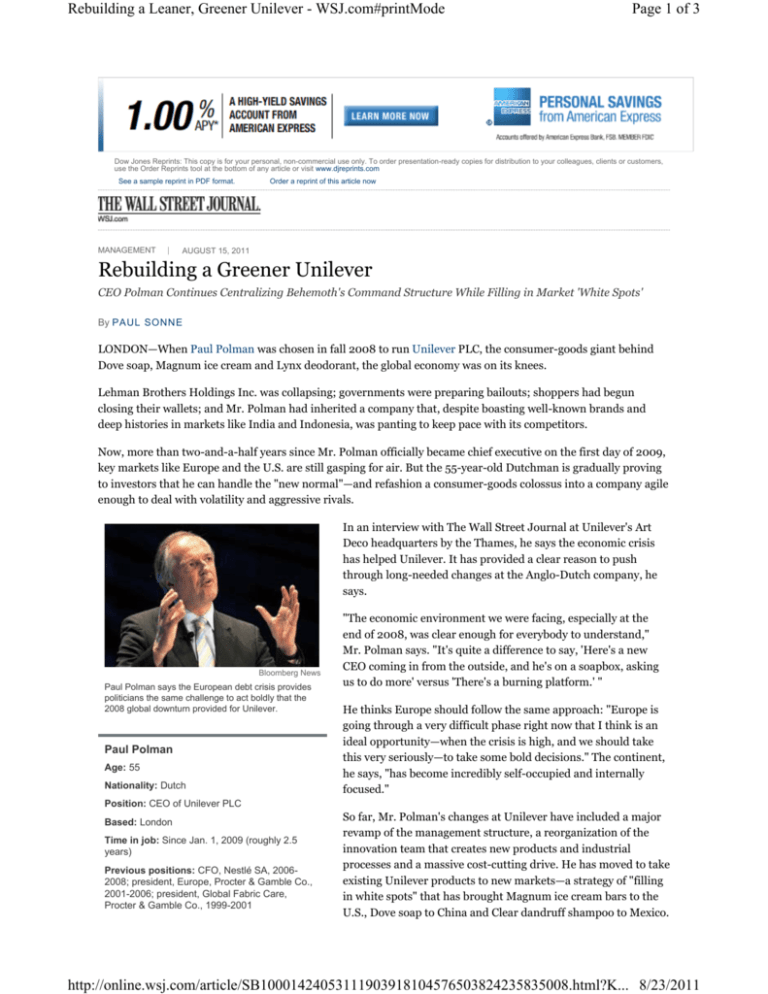
Rebuilding a Leaner, Greener Unilever - WSJ.com#printMode
Page 1 of 3
Dow Jones Reprints: This copy is for your personal, non-commercial use only. To order presentation-ready copies for distribution to your colleagues, clients or customers,
use the Order Reprints tool at the bottom of any article or visit www.djreprints.com
See a sample reprint in PDF format.
MANAGEMENT
Order a reprint of this article now
AUGUST 15, 2011
Rebuilding a Greener Unilever
CEO Polman Continues Centralizing Behemoth's Command Structure While Filling in Market 'White Spots'
By PAUL SONNE
LONDON—When Paul Polman was chosen in fall 2008 to run Unilever PLC, the consumer-goods giant behind
Dove soap, Magnum ice cream and Lynx deodorant, the global economy was on its knees.
Lehman Brothers Holdings Inc. was collapsing; governments were preparing bailouts; shoppers had begun
closing their wallets; and Mr. Polman had inherited a company that, despite boasting well-known brands and
deep histories in markets like India and Indonesia, was panting to keep pace with its competitors.
Now, more than two-and-a-half years since Mr. Polman officially became chief executive on the first day of 2009,
key markets like Europe and the U.S. are still gasping for air. But the 55-year-old Dutchman is gradually proving
to investors that he can handle the "new normal"—and refashion a consumer-goods colossus into a company agile
enough to deal with volatility and aggressive rivals.
In an interview with The Wall Street Journal at Unilever's Art
Deco headquarters by the Thames, he says the economic crisis
has helped Unilever. It has provided a clear reason to push
through long-needed changes at the Anglo-Dutch company, he
says.
Bloomberg News
Paul Polman says the European debt crisis provides
politicians the same challenge to act boldly that the
2008 global downturn provided for Unilever.
Paul Polman
Age: 55
Nationality: Dutch
"The economic environment we were facing, especially at the
end of 2008, was clear enough for everybody to understand,"
Mr. Polman says. "It's quite a difference to say, 'Here's a new
CEO coming in from the outside, and he's on a soapbox, asking
us to do more' versus 'There's a burning platform.' "
He thinks Europe should follow the same approach: "Europe is
going through a very difficult phase right now that I think is an
ideal opportunity—when the crisis is high, and we should take
this very seriously—to take some bold decisions." The continent,
he says, "has become incredibly self-occupied and internally
focused."
Position: CEO of Unilever PLC
Based: London
Time in job: Since Jan. 1, 2009 (roughly 2.5
years)
Previous positions: CFO, Nestlé SA, 20062008; president, Europe, Procter & Gamble Co.,
2001-2006; president, Global Fabric Care,
Procter & Gamble Co., 1999-2001
So far, Mr. Polman's changes at Unilever have included a major
revamp of the management structure, a reorganization of the
innovation team that creates new products and industrial
processes and a massive cost-cutting drive. He has moved to take
existing Unilever products to new markets—a strategy of "filling
in white spots" that has brought Magnum ice cream bars to the
U.S., Dove soap to China and Clear dandruff shampoo to Mexico.
http://online.wsj.com/article/SB10001424053111903918104576503824235835008.html?K... 8/23/2011
Rebuilding a Leaner, Greener Unilever - WSJ.com#printMode
Page 2 of 3
His long-stated goal is to double Unilever's sales while reducing
its environmental impact. So far, it has moved from sales of €39.8 billion ($56.8 billion) in 2009 to more than
€45 billion expected this year. The golden number is €80 billion, but Mr. Polman says he "will not be obsessed to
just go for the 80 number for the sake of the 80 number."
"We're talking here about a mindset of growth after a long time of not growing, or declining," he says. Though he
hasn't set a deadline, Mr. Polman says the company would need sales to rise by about 7% a year in order to double
in roughly 10 years. He believes Unilever can achieve at least 90% of that growth on its own, without acquisitions.
"We have 54% [of our business] in the emerging markets and we are only reaching 2 billion consumers a day," he
says. "There's no reason why we cannot reach 4 billion consumers. We have introduced, over the last two years,
130 of our products in countries where they were not in."
If Mr. Polman sounds impatient, it's because he is. He is eager for change at Unilever, a company that spent years
tripping over itself. For a long time, it was divided between headquarters in the U.K. and the Netherlands and had
two chief executives. Internal divisions, bureaucracy and inefficiency depressed performance. Annual sales
growth slowed from 5.0% in 1998 to a low of 0.7% in 2004, for instance, and remained in the low single digits for
years.
Many of the problems had their roots in history. Unilever was founded in 1930 when British soap company Lever
Brothers merged with Margarine Unie, a Dutch food firm that was itself a product of mergers. Unilever became
one of the first modern multinationals, pushing into the developing world on the coattails of British and Dutch
colonialism, with early businesses in India and Indonesia.
The result was a sprawling empire—a mishmash of companies operating independently in disparate regions but
sending checks back to the head office. It was the opposite of U.S. rival Procter & Gamble Co., known for its
centralized command structure controlled tightly from Cincinnati, Ohio.
Unilever's heritage has been both a curse and a blessing. It has spent years trying to shed its sluggishness, which
as recently as 2007 made it a target for buyout firms. But it has also enjoyed an entrenched presence in the
developing world—helpful now Europe and the U.S. are nursing economic woes.
"If you go to Hindustan Unilever or our Indonesian company, or any for that matter, you find companies that are
very much in tune with local society," Mr. Polman says. "That's true for Bangladesh, as much as for Indonesia or
Brazil. That's becoming an increasing advantage."
Mr. Polman's predecessor, Patrick Cescau, started cleaning up the company's organizational structure and
slimming the work force through a campaign known as "One Unilever." Mr. Polman is continuing the
transformation.
In the first half of 2011, sales rose 4.1% to €22.8 billion. Since January 2009, Unilever's shares on the London
Stock Exchange have risen to 1,984 pence from 1,621 pence, an 18.3% rise on Mr. Polman's watch.
The Unilever boss hails from Enschede, a Dutch textile-manufacturing town on the border with Germany, where
his father worked at a tire company. He considered becoming a priest before deciding to study economics at the
University of Groningen, about an hour-and-a-half's drive from his hometown. After graduation, he moved to the
U.S., arriving in Ohio to stay with friends of his parents and later completing MBA and MA degrees at the
University of Cincinnati. Nearby was the headquarters of Procter & Gamble, the consumer-goods behemoth
which Mr. Polman joined in 1979 and where he remained for 26 years. He rose through the ranks, eventually
becoming president of P&G's European operations in 2001, before jumping to Nestlé SA five years later to
become chief financial officer.
Today, one of Mr. Polman's main tasks is to fight off P&G, his employer of 26 years, and the maker of Pantene
shampoo and Ariel detergent. On the day Unilever announced its first-half financial results, Mr. Polman was
sporting cufflinks in the shape of the company's logo—a clear communication of his new loyalties.
http://online.wsj.com/article/SB10001424053111903918104576503824235835008.html?K... 8/23/2011
Rebuilding a Leaner, Greener Unilever - WSJ.com#printMode
Page 3 of 3
In recent years, P&G has been slashing prices on its products and increasing promotional activity to gain market
share. Unilever, meanwhile, has tried to raise its prices to protect margins.
"There is definitely a lot of value that has been taken out of the market," Mr. Polman says, when asked about
P&G's strategy of price-cutting and promotion. "That's one of the reasons I think we increasingly see the retailers
wanting to work with us and moving us up into the preferred-supplier status, because we are driving true value
with innovations into these markets."
He says Unilever isn't following a similar strategy, because "it's not a long-term successful strategy, we believe."
In addition to fending off rivals, Mr. Polman has been implementing policies that would allow Unilever to reduce
its environmental impact. It's a tough task because Unilever is now growing, and it includes not only its own
operations in the calculation, but also those of its suppliers and retailers.
"Our total carbon impact, across the total supply chain, is 300 million tons, and our own factories and travel is
only 3 million tons," Mr. Polman says. "So if we would focus on our own shop, that's one thing, but if we influence
the total supply chain, we have a much bigger influence."
The company has 50 targets in all. They include carbon-emissions aims, goals to increase the number of small
farmers supplying Unilever, and water-usage objectives. In many cases, the goals are forcing big changes to the
way Unilever does business.
Still, the sense of change isn't limited to sustainability initiatives. Asked what the biggest change he has seen so
far in his more than two years as chief executive, Mr. Polman is quick to answer. "I have seen a shift in
confidence," he says.
Write to Paul Sonne at paul.sonne@wsj.com
Copyright 2011 Dow Jones & Company, Inc. All Rights Reserved
This copy is for your personal, non-commercial use only. Distribution and use of this material are governed by our Subscriber Agreement and by
copyright law. For non-personal use or to order multiple copies, please contact Dow Jones Reprints at 1-800-843-0008 or visit
www.djreprints.com
http://online.wsj.com/article/SB10001424053111903918104576503824235835008.html?K... 8/23/2011

